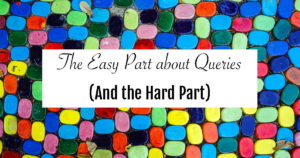 If you want to be traditionally published, there are two pathways—the query and the pitch. Queries are free and you can send a lot of them. Pitches are more difficult and usually cost money. More about pitches in my next blog.
If you want to be traditionally published, there are two pathways—the query and the pitch. Queries are free and you can send a lot of them. Pitches are more difficult and usually cost money. More about pitches in my next blog.
The Easy Part
Queries are formulaic. You can find lots of templates online, but they all include the same basic elements—your genre and wordcount, something about your plot and characters, a bit about yourself, your book’s place in the market, awards and blurbs, etc.
Once you’ve drafted your core paragraphs, you can copy and paste them into any number of emails.
And it’s easy to search for the top publishers and literary agencies in America and shoot out a query to all of them.
But that’s not the smart way to do it. The smart way to do it is…
The Hard Part
Research. Research. Research.
You must find the agents and acquisition editors who work in your genre, are open to submissions and welcome new authors. And that’s just for starters.
To really connect with the right people, you have to dive deep into every publisher and agency website, read every bio, look at every list of authors and books the agent or editor has been involved with. Then Google your targets and find them on social media. Learn what they’re reading, representing, or publishing right now.
Use that information to decide not only who to query but more importantly how to customize the top of your email to speak directly to that person. They will appreciate that you’re sending what they want, that you made the effort to find out, and that you put the important information in the first sentence.
This is time consuming and can be tedious, but it gives you the best chance of success.
No Smoke Signals
Do NOT blow smoke. Don’t tell them how great they are, how many of the books they’ve represented or published you love, or how terrific you’ve heard they are to work with. And don’t tell them how they can fulfill your lifelong dreams.
Give them a GOOD reason to continue reading your query and to consider reading your sample pages—like your book is exactly what they’re looking for based on the criteria they list on their website, which you have read. Or that you watched a video of a talk they gave and your hero is just the kind of character they are looking for, with specifics.
You also have to demonstrate that you can follow simple directions. Every agent and publisher has their own requirements for queries—how long they should be, where to send them and when, whether and when to follow-up, and, importantly, whether to send a sample, and how long, and whether within the email or as an attachment.
If you don’t follow each person’s directions, they will probably delete your query unread. These people are busy. Help them find a reason to make time for you.
Email Postage is Free
Send as many queries as you can, within these guidelines. Create a spreadsheet to keep track.
Someone once lamented to me that they’d sent three queries nearly two weeks earlier and hadn’t heard anything back. Don’t send three. Send dozens. And be prepared to wait, while sending reminders according to each target’s guidelines (usually after at least three months!).
Guaranteed Responses
There are no guarantees! Even with research and customization, many of your queries will not be answered. Most of the rest will be rejected.
Needs change. Categories get filled. People are overwhelmed or just in a foul mood. Sometimes, only an assistant will see your query. Often, there is no clear reason why you were rejected or not answered. One reason might be that they get tens of thousands of queries every year.
I once customized a query like this: “You want action, I have a series of terrorist attacks. You want compelling characters, I have a young American undercover inside the Taliban. You want exotic locales. I have a terrorist camp in Afghanistan.” That person wrote back, “Your book is not what I’m looking for.” I wanted to respond, “YES IT IS!!!”
But I didn’t. Which brings me to my next point.
Mind Your Ps
Querying is a long Process. For me, it was twenty-nine months from first query to offer. And that’s not bad.
You must be Patient, and you must remain Professional. Resist the temptation to lash out.
But you must also be Persistent. Follow up on the schedule they suggest, especially with people who request a full manuscript. I sent friendly, professional nudges to my eventual publisher for ten months before she carved out the time to read my manuscript. She thanked me for the reminders, for their tone and for my patience, and made me an offer before she even finished reading.
And Mind One Q
Your query is the first sample of your writing that the recipient sees. To have any chance of a positive response, it must be of the highest possible Quality, just like your manuscript. Run it past your critique partners. Send it to your editor. Make sure it’s everything it needs to be. (You do have an editor, right? Ah, another blog idea.)
Then, research, customize and send, send, send.

Ann Henry
Great advice, Al. Thanks!